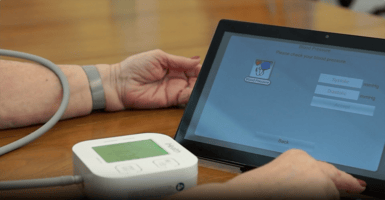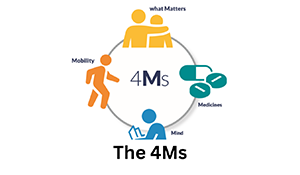Innovating in Diabetes Management with Senscio's Self-Recovery Protocols
Developing Self-Recovery Protocols to Help Ibis Health Members with Diabetes Prevent Decline Before it Happens
Everyone knows of at least someone who struggles with diabetes and the havoc it can wreak. More than 37 million Americans currently have the disease, and estimates suggest more than 1 in 3 adults will face a diagnosis at some point in their lives.
A pervasive condition that affects nearly every organ in the body, diabetes is also costly. Considered the most expensive chronic condition in the nation, roughly $1 out of every $4 in U.S. health care costs is spent caring for those with diabetes, amounting to an estimated $327 billion per year, according to the U.S. Centers for Disease Control and Prevention. Adults ages 65 and older account for nearly two-thirds of these costs.
But there are ways to reduce the costs and ease the burdens on individuals who struggle with diabetes and the families who care for them. Getting control over blood sugar levels can cut the risk of diabetes-related eye disease, kidney disease and nerve disease nearly in half, according to the CDC. Regular monitoring of the eyes, kidneys and foot care can reduce complications considerably.
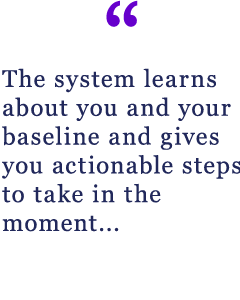
Senscio Systems’ Ibis Health program is already working to fill gaps in care for thousands from across New England. Combining AI-powered round-the-clock virtual care with clinical team support, Ibis Health engages patients in dynamic daily planning, tracking weight, medications, blood pressure, diet and other health indicators to flag risks for decline before it happens. By developing partnerships with primary care practices to coordinate care between doctor’s visits, the program serves as a lifeline for its members, who benefit from a personalized approach that adapts to their specific needs.
Now the CIC is looking to take the support that Ibis Health provides and raise it to the next level, developing preventive and self-recovery algorithms to be incorporated by clinicians in individual patient care plans for a range of chronic conditions, including congestive heart failure, chronic kidney disease, chronic obstructive pulmonary disease, asthma, hypertension, diabetes and depression and anxiety. Future clinical areas might include long Covid, substance abuse, Alzheimer’s disease, chronic pain and cholesterol/cardiac risk.
That’s where Ibis Health can help.
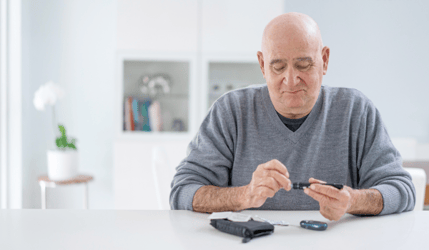
An innovative chronic care management program from Senscio Systems, Ibis Health utilizes a remote care team and the patented AI-powered IbisHub™ platform that connects members to clinical specialists in real time, empowering individuals to take control over their chronic conditions and improve their well-being in between visits with their primary care physician and specialists. Data collected in the home create insights for timely intervention and goal-based health improvements.
The program is especially well-suited for diabetics, who are primed from the moment of their diagnosis to monitor their blood sugar levels — often multiple times throughout the day — to avoid complications of the disease, which can include stroke, blindness, and organ and tissue damage, said Dr. Karthik Ravindran, an internist and chronic care specialist who also serves as Senscio Systems’ chief medical director.
Ravindran believes the Ibis Health program could also help patients avoid unnecessary trips to the emergency room or hospital by alerting them when their condition starts to decline and giving them the tools to reverse that decline before it reaches a critical stage.
As a member of Senscio Systems’ Clinical Innovation Council, Ravindran has been working to develop self-recovery protocols to help diabetics manage potentially dangerous high and low blood sugars to prevent the situation from progressing to a hospitalization or worse.
Blood sugars are constantly affected by what an individual eats or does, whether that’s skipping a meal, going for a run or enjoying a piece of chocolate cake. In a healthy individual, the body has all sorts of internal mechanisms to make sure those levels don’t go too high or too low, but in diabetics, “there’s no safety mechanism internally — or the internal safety mechanism is affected by the treatments or medicines a patient is taking — and you can bottom out or top off,” Ravindran said. “Those extremes on either end can be dangerous.”
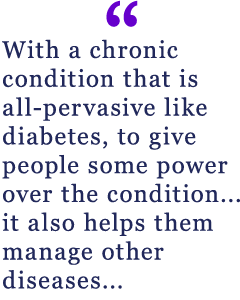 The self-recovery protocols the CIC is developing are designed to act as an external safety mechanism, Ravindran explained, alerting individuals when their blood sugars are headed in a dangerous direction and giving them steps to take from the comfort of their homes to quickly get their levels under control.
The self-recovery protocols the CIC is developing are designed to act as an external safety mechanism, Ravindran explained, alerting individuals when their blood sugars are headed in a dangerous direction and giving them steps to take from the comfort of their homes to quickly get their levels under control.
“What we are trying to do is to take that tracking data which you are doing already — measuring blood sugar levels — and create an external system to respond to these extremes,” Ravindran said. “The protocols are there to alert you that there’s something going on, so if a sugar level starts to drift to a dangerously low level, let’s make sure we grab something sweet to help bring the sugars up. Or if they start to run extremely high, let’s perhaps take a bit more insulin today to keep it from going out of control.”
These self-recovery protocols distinguish the Ibis Health program from other virtual monitoring programs that simply record blood sugar levels and possibly alert, Ravindran said.

“A lot of platforms check the sugars and the data goes somewhere, maybe it gets sent to the PCPs. But when stuff hits the fan, how do you respond in a way that is customized? [With Ibis Health], the system learns about you and your baseline and gives you actionable steps to take in the moment,” Ravindran explained, whether it’s reaching for that 5-cent lifesaver or cup of juice, administering an extra shot of insulin or calling your doctor to ask about a change in dosage in your medication.
“If I am dealing with this chronic condition, with the traditional way, it’s a feeling of powerlessness to some degree. I have this situation, sugars go up, sugars go down, sometimes I don’t know why and I have to call my doctor,” Ravindran said. “Whereas if you follow the protocols, you are empowering yourself to put out the fire: ‘I don’t need the fire person to put out the fire. I can save myself with a set of tools that have been designed by medical experts.’”
And that sense of empowerment has meaning and impact on an individual’s quality of life that goes beyond reduced health care costs, Ravindran said.
“I can’t quantify that in a number, but the value of giving people with a chronic condition that is all-pervasive like diabetes, to give people some power over the condition, it means a lot and it also helps them manage other diseases,” Ravindran said. “Because you realize there are a lot of things we have power over. There are things we can’t control, but there are things we can control. It helps patients empower themselves to reach for that fire extinguisher.”
To learn more about Senscio Systems and its innovative Ibis Health Program visit www.sensciosystems.com and www.ibishealth.org.
Want to receive more insightful articles like this? Sign-up for our free monthly e-newsletter:


